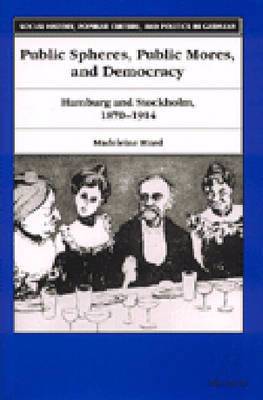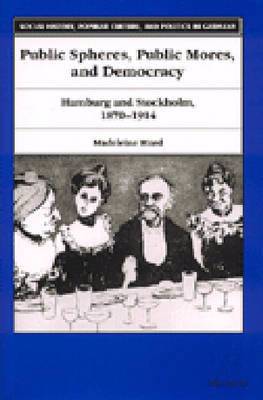
- Afhalen na 1 uur in een winkel met voorraad
- Gratis thuislevering in België vanaf € 30
- Ruim aanbod met 7 miljoen producten
- Afhalen na 1 uur in een winkel met voorraad
- Gratis thuislevering in België vanaf € 30
- Ruim aanbod met 7 miljoen producten
Zoeken
Public Spheres, Public Mores, and Democracy
Hamburg and Stockholm, 1870-1914
Madeleine Montague Hurd
€ 152,95
+ 305 punten
Omschrijving
In the long debate about the failure of German democracy in the early twentieth century, most comparisons have been made, implicitly or explicitly, with Great Britain. Madeleine Hurd's Public Spheres, Public Mores, and Democracy proposes a useful alternative--the comparison of prewar Germany with Sweden, which, like Germany, was characterized by a conservative monarchy, late industrialization, and a weak, fractured bourgeoisie.
Hurd's book offers the reader a close analysis of the political impact of nineteenth-century cultural and educational crusades, linking the process of democratization to left-wing parties' use of cultural, educational, and freethinking appeals. Both socialist and left-liberal leaders emphasized the politics of taste, sobriety, and self-respect, challenging realities and perceptions of who was acceptable in the public political sphere and who was to be excluded as immature, uncultured, and uncouth.
The two-city comparison suggests interesting conclusions. Moral and educational crusades could bring liberals and socialists together in common attacks on a drunken and irresponsible plutocracy. Cultural issues could also drive them apart, as the bourgeoisie and workers established rival claims to public respectability and autonomy. Public Spheres, Public Mores, and Democracy provides a compelling account of how the moral content of citizenship claims affected each city's and each country's long-term democratic stability. In the process, it indicates new ways of understanding the historical realities, and values, of the bourgeois public sphere.
Madeleine Hurd is Assistant Professor of History, University of Pittsburgh.
Hurd's book offers the reader a close analysis of the political impact of nineteenth-century cultural and educational crusades, linking the process of democratization to left-wing parties' use of cultural, educational, and freethinking appeals. Both socialist and left-liberal leaders emphasized the politics of taste, sobriety, and self-respect, challenging realities and perceptions of who was acceptable in the public political sphere and who was to be excluded as immature, uncultured, and uncouth.
The two-city comparison suggests interesting conclusions. Moral and educational crusades could bring liberals and socialists together in common attacks on a drunken and irresponsible plutocracy. Cultural issues could also drive them apart, as the bourgeoisie and workers established rival claims to public respectability and autonomy. Public Spheres, Public Mores, and Democracy provides a compelling account of how the moral content of citizenship claims affected each city's and each country's long-term democratic stability. In the process, it indicates new ways of understanding the historical realities, and values, of the bourgeois public sphere.
Madeleine Hurd is Assistant Professor of History, University of Pittsburgh.
Specificaties
Betrokkenen
- Auteur(s):
- Uitgeverij:
Inhoud
- Aantal bladzijden:
- 328
- Taal:
- Engels
- Reeks:
Eigenschappen
- Productcode (EAN):
- 9780472110674
- Verschijningsdatum:
- 13/07/2000
- Uitvoering:
- Hardcover
- Formaat:
- Genaaid
- Afmetingen:
- 161 mm x 237 mm
- Gewicht:
- 576 g

Alleen bij Standaard Boekhandel
+ 305 punten op je klantenkaart van Standaard Boekhandel
Beoordelingen
We publiceren alleen reviews die voldoen aan de voorwaarden voor reviews. Bekijk onze voorwaarden voor reviews.











